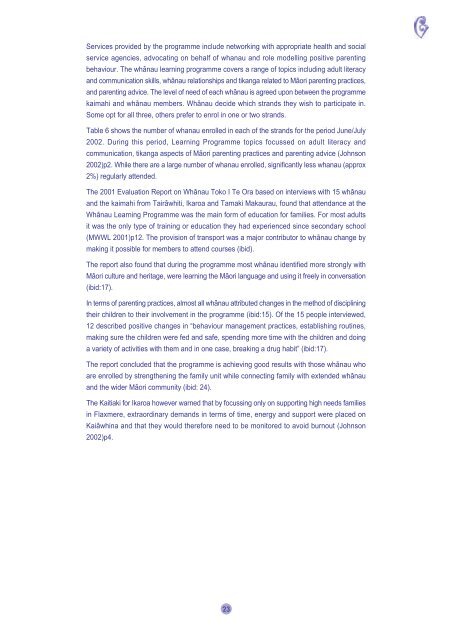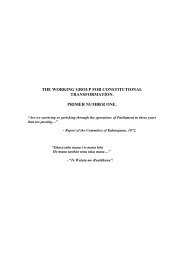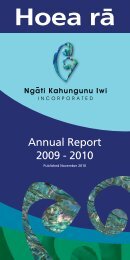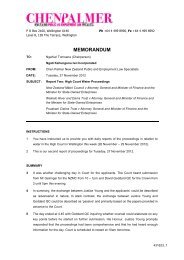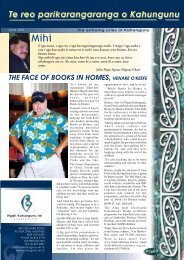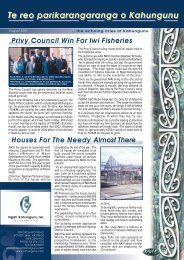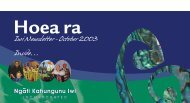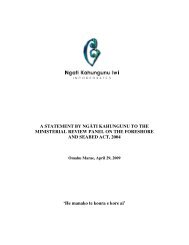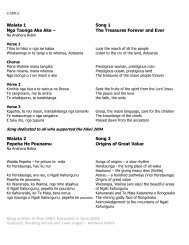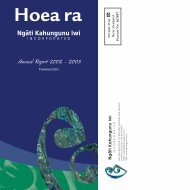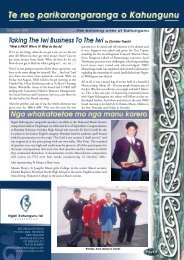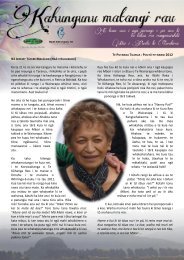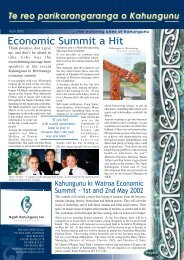Matauranga Strategy - NgÄti Kahungunu Iwi Incorporated
Matauranga Strategy - NgÄti Kahungunu Iwi Incorporated
Matauranga Strategy - NgÄti Kahungunu Iwi Incorporated
You also want an ePaper? Increase the reach of your titles
YUMPU automatically turns print PDFs into web optimized ePapers that Google loves.
Services provided by the programme include networking with appropriate health and social<br />
service agencies, advocating on behalf of whanau and role modelling positive parenting<br />
behaviour. The whänau learning programme covers a range of topics including adult literacy<br />
and communication skills, whänau relationships and tikanga related to Mäori parenting practices,<br />
and parenting advice. The level of need of each whänau is agreed upon between the programme<br />
kaimahi and whänau members. Whänau decide which strands they wish to participate in.<br />
Some opt for all three, others prefer to enrol in one or two strands.<br />
Table 6 shows the number of whanau enrolled in each of the strands for the period June/July<br />
2002. During this period, Learning Programme topics focussed on adult literacy and<br />
communication, tikanga aspects of Mäori parenting practices and parenting advice (Johnson<br />
2002)p2. While there are a large number of whanau enrolled, significantly less whanau (approx<br />
2%) regularly attended.<br />
The 2001 Evaluation Report on Whänau Toko I Te Ora based on interviews with 15 whänau<br />
and the kaimahi from Tairäwhiti, Ikaroa and Tamaki Makaurau, found that attendance at the<br />
Whänau Learning Programme was the main form of education for families. For most adults<br />
it was the only type of training or education they had experienced since secondary school<br />
(MWWL 2001)p12. The provision of transport was a major contributor to whänau change by<br />
making it possible for members to attend courses (ibid).<br />
The report also found that during the programme most whänau identified more strongly with<br />
Mäori culture and heritage, were learning the Mäori language and using it freely in conversation<br />
(ibid:17).<br />
In terms of parenting practices, almost all whänau attributed changes in the method of disciplining<br />
their children to their involvement in the programme (ibid:15). Of the 15 people interviewed,<br />
12 described positive changes in “behaviour management practices, establishing routines,<br />
making sure the children were fed and safe, spending more time with the children and doing<br />
a variety of activities with them and in one case, breaking a drug habit” (ibid:17).<br />
The report concluded that the programme is achieving good results with those whänau who<br />
are enrolled by strengthening the family unit while connecting family with extended whänau<br />
and the wider Mäori community (ibid: 24).<br />
The Kaitiaki for Ikaroa however warned that by focussing only on supporting high needs families<br />
in Flaxmere, extraordinary demands in terms of time, energy and support were placed on<br />
Kaiäwhina and that they would therefore need to be monitored to avoid burnout (Johnson<br />
2002)p4.<br />
23


